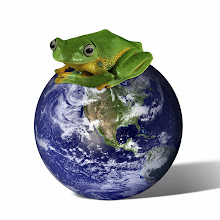In the days when few people lived to see old age even in the best of circumstances, Mother Nature apparently took an evolutionary gamble -- in the hope that the new human being would survive long enough to at least pass along his genes.
In Africa, a mutated gene in some persons distorts the shape of the red blood cells. This, for reasons too lengthy to explain here, helps to protect such a person from malaria -- an ancient, rampant killer on that continent. We call that mutation sickle cell anemia and we also call it a disease, an awful, painful disease. But malaria kills much faster than sickle cell anemia.
Today, I have learned about another one of evolution's trade-offs.
From wikipedia:
"It has also been hypothesized that the cystic fibrosis genetic mutation has been maintained in humans due to a selective advantage: heterozygous carriers of the mutation (who are thus not affected by cystic fibrosis) are more resistant to V. cholerae infections.[19] In this model, the genetic deficiency in the cystic fibrosis transmembrane conductance regulator channel proteins interferes with bacteria binding to the gastrointestinal epithelium, thus reducing the effects of an infection."
Cholera kills much, much faster than cystic fibrosis.
It makes one wonder how many more of these trade-offs have been made, how many more of the autoimmune diseases have a hidden silver lining in their dark cloud.
Tuesday, May 12, 2009
Nature's gamble
Posted by
Eastcoastdweller
at
1:19 PM
5
comments
![]()
Friday, May 8, 2009
Eating June Bugs
So I watched last night perhaps the best two "Bizzare Foods" episodes I have ever seen. Was an incredible reminder that one does not have to hike into the Burmese rain forest to encounter fascinating cultures and foods.
First in Maine, then in the Appalachians -- practically my back yard -- the narrator, Andrew Zimmern, cruised through lands of stunning beauty and antiquity. I really appreciated how he sought out and spent time in Cherokee country, talking about and sampling America's "original cuisine" -- such things as trout seasoned with sumac berries.
Ever craved eating a roasted June bug? I didn't before last night. Now I am very curious. They are described as having a rich, sweet,walnutty taste.
In doing a little more research on the subject, I found another great blog to enjoy:
http://intotheborderlands.blogspot.com/2008/06/eating-brown.html
Posted by
Eastcoastdweller
at
10:11 AM
1 comments
![]()
Labels: blogs, food, foraging, Native Americans
Friday, May 1, 2009
Who ARE these people?
When droughts hit, I read officials who implore us not to wash our cars more than once a week.
I think I last washed mine a year ago.
Now this, from the New York Times:
"...Extrapolated to all Americans in the age group studied, the new findings suggest that over the course of a decade, the deaths of one million men and perhaps half a million women could be prevented just by eating less red and processed meats, according to estimates prepared by Dr. Barry Popkin, who wrote an editorial accompanying the report.
http://www.nytimes.com/2009/04/28/health/28brod.html?_r=1&em
"To prevent premature deaths related to red and processed meats, Dr. Popkin suggested in an interview that people should eat a hamburger only once or twice a week instead of every day, a small steak once a week instead of every other day, and a hot dog every month and a half instead of once a week."
Hey, I love me a burger and I love me a steak. But WHO eats a hamburger every single day? WHO eats steak every other day? WHO are these clueless carnivores with fat wallets and fatter bellies?
Posted by
Eastcoastdweller
at
2:18 PM
1 comments
![]()
Five things wrong ...
Five things wrong with the U.S.of A. today:
1. A society based on the rule of law is a Roman innovation, and a brilliant one, a bulwark against tyranny of the minority or the majority. Thus, in history, law codes gradually supplanted tribal justice and the use of community shaming in order to maintain a sense of morality. However, relying wholly on the rule of law can cause a problem: No one fears to offend, or feels shame in violating, mere ink and paper scribblings. If the law is not "written in our hearts," we have a problem. Rule of law also spawns legions of lawyers making their fortunes trying to outwit it, and keeps legislators in a constant battle to keep up with the latest outrages, from cell phones while driving to the plague of underage "s$xting." Basic shame is so very old-fashioned.
2. Education. I sound like some wheezy old grandfather, but there are countries in the world in which children walk for miles each day to sit in some hovel of a building with the barest rudiments of educational materials, so hungry are they to learn. By contrast, most American children consider "school" akin to prison and being devoted to learning horribly "uncool." Also, far from being the respected sage he/she once was, today's teacher must constantly walk on eggshells lest he/she be sued, and runs the risk of poisoning if he/she leaves a coffee cup unguarded in the classroom.
3. Economy. It's based on an ever expanding cycle of exploitation, a sort of pyramid scheme with Earth as collateral and all of us as eventual suckers. This is certainly not solely an American problem. And world socialism proved no better, even much worse, than capitalism, at resolving this dillema. There is a problem when prosperity depends on wringing more and more crops out of more and more exhausted soil, on building more and more gas stations and shopping malls where forests once grew, on constantly taking, taking, taking. That problem is that eventually, the soil is dead, the forests are gone and the minerals are all extracted and shipped away. You can only eat so many potato chips out of a bag before it becomes empty and useless.
4. Two-party system. These days, it's becoming more like one and a half. I am quite aware of the flaws of parliamentary rule in other lands, where coalitions constantly form and break up, and centrist parties can be at the mercy of wacky loons and fringe parties. But I am emphatically neither a Democrat nor a strong Republican so I am in essence left out of the political process, forced each election to choose one or the other of people I more and more like less and less.
5. Losing touch. We are losing touch with history. Go to Mt. Vernon and you will find out how long it has been since a sitting U.S. president bothered to visit our first president's estate, a stone's throw from Washington D.C. We are also losing touch with nature. And we are losing touch with the values taught in our mostly agrarian past: Love for the land, self-reliance, a sense of the seasons, hard work, love for hard work, patience in adversity and even delayed gratification -- corn doesn't grow in a week unless you are playing Farmtown on Facebook.
Posted by
Eastcoastdweller
at
11:39 AM
2
comments
![]()
Labels: a rare foray into politics, children, education, farming, George Washington, human nature, Mt. Vernon, Native Americans















